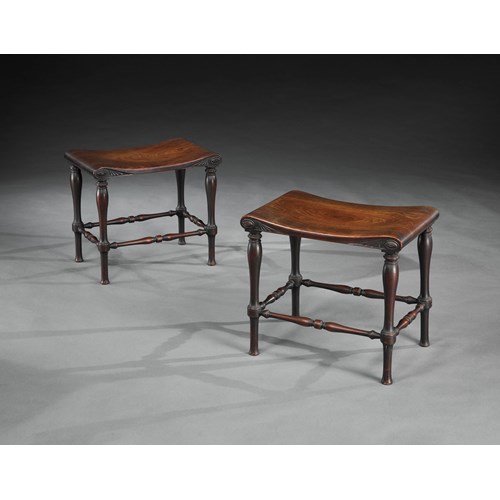Marketplace
A George III Satinwood Marquetry Giltwood and Composition Demi-Line Side Table
A George III Satinwood Marquetry Giltwood and Composition Demi-Line Side Table
Date Circa 1780
Epoque 18th century
Origine English
Medium Satinwood
Dimension 84 x 123 x 60.5 cm (33¹/₈ x 48³/₈ x 23⁷/₈ inches)
The semi-eliptical top veneered in finely figured West Indian satinwood, crossbanded in kingwood and tulipwood with a marquetry border of flowers and ribbons. The giltwood base with a frieze applied with paterae and husks tied with ribbons. The central oval tablet painted on grisaille on a dark blue background, depicting Ceres the Roman Goddess of fertility and agriculture being tended to by her servants. The four truned and fluted legs headed by beads and acanthus leaves.
The central painted medallion depicts Ceres the Roman and Greek goddress of agriculture. Similar to Bacchus, she tends to be associated in the 18th century dining room. Ceres was the goddess of agriculture, grain and motherly love. She was the daughter of Saturn and Ops, the sister of Jupiter, and the mother of Proserpine.
The table was in the collection of the Cunninghame Graham family and on loan to Culzean Castle between 1982-2017. It was probably originally acquired by Robert Cunninghame Graham, d. 1797, who was a well-known Scottish politician and poet. Interestingly, Robert is now remembered for a poen 'If Dought Deeds my Lady Please,' which was later set to music by his great-great grandson and Sir Arthur Sulivan. Robert Graham inherited a number of estates throughout his life and twice changed his name in accordances with his inheritances. At his death he was enormously wealthy with estates located in Perthshire, Dunbartonshire, Renfrewshire, Lanarkshire, as well as owning a Jamaican plantation.
More recently, whilst belonging to Lady Patricia Cunninghame Graham, the table was on loan at Culzean Castle from 1982-2017.
The central painted medallion depicts Ceres the Roman and Greek goddress of agriculture. Similar to Bacchus, she tends to be associated in the 18th century dining room. Ceres was the goddess of agriculture, grain and motherly love. She was the daughter of Saturn and Ops, the sister of Jupiter, and the mother of Proserpine.
The table was in the collection of the Cunninghame Graham family and on loan to Culzean Castle between 1982-2017. It was probably originally acquired by Robert Cunninghame Graham, d. 1797, who was a well-known Scottish politician and poet. Interestingly, Robert is now remembered for a poen 'If Dought Deeds my Lady Please,' which was later set to music by his great-great grandson and Sir Arthur Sulivan. Robert Graham inherited a number of estates throughout his life and twice changed his name in accordances with his inheritances. At his death he was enormously wealthy with estates located in Perthshire, Dunbartonshire, Renfrewshire, Lanarkshire, as well as owning a Jamaican plantation.
More recently, whilst belonging to Lady Patricia Cunninghame Graham, the table was on loan at Culzean Castle from 1982-2017.
Date: Circa 1780
Epoque: 18th century
Origine: English
Medium: Satinwood
Dimension: 84 x 123 x 60.5 cm (33¹/₈ x 48³/₈ x 23⁷/₈ inches)
Provenance: Robert Cunninghame Graham (1737-1797), ether at Finlaystone House (sold 1862), Gartmore House (sold 1900) or Ardoch House and by descent to:
Lady Patricia Cunninghame Graham (on loan to Culzean Castle, 1982-2017).
Plus d'œuvres d'art de la Galerie





-Moon Jar_T638348663196986836.jpg?width=500&height=500&mode=pad&scale=both&qlt=90&format=jpg)



